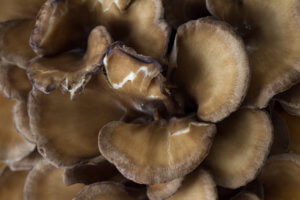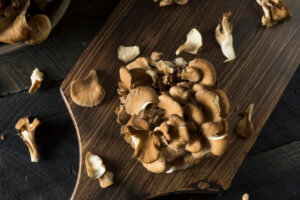It’s fair to say that medicinal mushrooms are finally getting the recognition they deserve as “super shrooms”. But some varieties, like maitake mushroom, are still flying under the radar in spite of their incredible health benefits.
Maitake, sometimes nicknamed “king of mushrooms”, is both delicious and nutritious. It’s filled with powerful nutrients and plant compounds that boost numerous aspects of health and has been celebrated in Japan for many, many years because of these health-boosting properties.
If you haven’t heard about maitake yet or all that it can do, read on to learn more about this mushroom king.

What is Maitake? The Dancing Mushroom
Maitake mushroom (Grifola frondosa) grows natively in certain regions of China, Japan, and North America. It’s usually found growing at the base of maple, oak, and elm trees and has a distinct frilly, almost coral-like appearance.
Over the years, maitake has gained many nicknames. In Japanese, the word maitake means ‘dancing’ and refers, not to dancing mushrooms, but to people dancing with happiness after finding the mushroom in the wild. It’s also called “hen of the woods” because of its resemblance to a fan-like hen tail.
As already mentioned, maitake even has the more impressive nickname of “king of mushrooms”. This could refer to its many health benefits or perhaps to its size, since maitake averages about 10 pounds in weight and can grow to over 100 pounds!
Unlike some other medicinal mushrooms, maitake has a delicious, earthy flavor and delicate texture. This has given it both medicinal and culinary value for centuries.
A Japanese Love for Maitake

Asian cultures have long recognized the outstanding benefits of maitake mushroom. It has a firm place in traditional Chinese medicine, but this shroom has made even more of a mark in Japanese history.
According to lore, it was a group of Buddhist nuns and woodcutters who first discovered maitake in Japan. The mushroom would go on to have a central place in Japanese herbology and cuisine, lasting all the way to modern times.
Some legends state that maitake was worth its weight in silver to anyone fortunate enough to find it growing in the wild (hence why people danced at finding it). It was also given as a gift to Shoguns by local lords to gain favor and rewards.
The popularity of maitake mushroom, particularly among royalty, led to the development of expert Japanese mushroom foragers who still continue their work today. Even though maitake has become largely cultivated, many believe that the wild-grown fungi are superior.
On the medicinal side, maitake mushroom was thought to be a tonic for the immune system, blood pressure, and overall vitality.
Interestingly, all of these medicinal properties have received some kind of confirmation from modern research!
Top Benefits of Maitake Mushroom
Loaded with Nutrients & Antioxidants
Like many other mushroom varieties, maitake is loaded with nutrients, powerful plant compounds, and antioxidants.
Most notably, maitake is a good source of B vitamins (niacin, riboflavin, thiamine, folate), copper, potassium, and phosphorus. The mushrooms also contain smaller amounts of zinc, manganese, selenium, and vitamin B6.
Wild-grown maitake is typically high in vitamin D as well, although the amount will vary based on how much sunlight the mushrooms were exposed to.
In addition to vitamins and minerals, a one cup serving of maitake gives you a decent amount of protein and nearly 2 grams of fiber. You’ll also be consuming highly beneficial polysaccharides known as beta glucans. Beta glucans have documented immune-boosting and antitumor properties— but more on that later.
Finally, no superfood would be complete without the presence of anti-aging antioxidants.
Maitake contains a powerful array, including phenols, flavonoids, vitamin C, and vitamin E. These specific antioxidants can fight many age-related diseases, including cancer and neurodegenerative disorders.
Adaptogenic Properties that Fight Stress

One of the best benefits of maitake mushroom for modern times is its adaptogenic properties.
Adaptogens are herbs and foods that help protect you from the effects of both physical and mental stressors. Essentially, they help your body adapt to stress, reducing its impact. If you’re like most people, you could certainly benefit from this ability!
The term “adaptogen” was first used in the 1940s. It was originally defined as a natural substance or plant extract that had non-specific action to enhance the human body’s resistance to adverse conditions, particularly stress.
Since that time, multiple studies have been conducted on herbal adaptogens with some impressive results.
Overall, adaptogens have shown the ability to decrease fatigue, ease symptoms of anxiety and depression, sharpen mental performance, and even change the chemical stress response within your body. They have also demonstrated nootropic and neuroprotective properties, meaning they help to enhance and protect your brain.
The bottom line is that maitake mushroom can be a huge benefit to your body and mind by combating the negative effects of stress. However, like other adaptogens, it does need to be taken for a period of time (at least 2-3 weeks) before you will notice the full effects.
Unique Cancer-Fighting Potential
The idea of using medicinal mushrooms to fight cancer isn’t a new one. Turkey tail mushroom has potent anticancer potential and is even used as an adjuvant cancer treatment in Japan.
Now, research is showing that there are also potential benefits of maitake mushroom for fighting cancer— some very unique ones.
The main cancer-fighting component of maitake is the polysaccharides it contains (particularly beta glucans). A specific portion of these polysaccharides can be isolated into an extract known as D-Fraction. This unique extract has shown antitumoral and antimetastatic activity AND an ability to inhibit human breast cancer cells.
In a very small human trial with cancer patients, D-Fraction appeared to repress cancer progression primarily by stimulating natural killer cells. It has also been able to enhance the action of a cancer-fighting protein in lab studies.
Other preclinical studies have found that maitake extract can suppress tumor growth, though this has yet to be tested in a human model.
The bottom line is that maitake has shown the potential to fight cancer on its own and enhance other cancer treatments. Hopefully, research will continue to progress and find clinical uses for D-Fraction.
Strengthens Immune Function

One of the ways maitake fights cancer cells is by stimulating the immune system. This enhanced immune response can be beneficial for your body to fend off normal infections as well as cancer.
Yet again, this effect comes from the powerful polysaccharides within maitake, particularly beta glucans. They stimulate natural killer cells, which go after tumor cells and cells infected with a virus, as well as other defensive immune cells.
In one study, an extract from maitake mushroom produced “significant stimulation of defense reaction” in the immune system. Interestingly, the immune-enhancing effects were even stronger when maitake and shiitake extracts were paired together. A good case for consuming a variety of medicinal mushrooms!
One important note to make is that maitake mushroom doesn’t simply stimulate your immune system and leave it “turned up” all the time (which could be harmful).
In fact, a different study discovered that maitake acts more like an immunomodulator than a true immunostimulator, meaning it upregulates or downregulates immune reaction and inflammatory responses as needed.
Good for Digestion & A Healthy Gut
Another of the benefits of consuming maitake mushroom regularly is for your digestion.
Not only do polysaccharides and beta glucans have powerful health properties, they are also forms of soluble fiber. This means they form a thick, gel-like substance in your digestive tract, which helps to “keep you regular”. As a bonus, beta glucan also slows the absorption of sugar and reduces cholesterol absorption in your digestive tract.
Even better is the fact that beta glucans are prebiotic fibers. This means they feed the highly important probiotics living within your gut. Studies have shown that they actually improve the growth and colonization of beneficial microorganisms, which is incredible!
On another note, some preliminary studies have found that maitake extract may be able to alleviate intestinal inflammation. This could be a huge finding for sufferers of IBD and other inflammatory gut disorders, but more research is still needed in this area.
Potential to Support Heart Health

Some early studies have shown that maitake mushroom may be able to help with two specific areas of heart health: cholesterol and blood pressure.
As mentioned in the previous section, the beta glucans in maitake have the ability to reduce cholesterol absorption in your digestive tract. This is likely why maitake mushroom was able to lower cholesterol levels in one study. In theory, this would help to keep arteries open and blood flowing to the heart.
In another study, supplementation with maitake was able to reduce age-related hypertension. These results were confirmed in a separate animal model that found maitake significantly reduced blood pressure over a period of 8 weeks.
Unfortunately, high quality clinical trials on maitake and heart health are still lacking. But given the presence of beta glucans in the mushrooms (also found in heart-healthy oats), it’s safe to conclude that maitake possesses some type of heart-supportive properties.
May Help Balance Blood Sugar Levels
Having consistently high blood sugar levels is a big risk factor for type 2 diabetes. And while a healthy diet is one of the best ways to manage blood sugar, there may be some added benefits of maitake mushroom for blood sugar control.
Once again, we come back to the beta glucans and other polysaccharides found in maitake. By acting as soluble fiber within your digestive tract, they are able to slow the absorption of sugar into your bloodstream. This can help to keep blood sugar more balanced instead of spiking after a snack or meal.
Some preliminary studies have indeed confirmed that maitake has the potential to balance or lower blood sugar.
For example, it was found to improve glucose tolerance and blood glucose levels in one study. A separate animal model also found that a unique maitake preparation was able to improve “diabetes-induced alterations” and positively affected blood glucose levels.
May Promote Fertility

Infertility is a frustrating challenge for many people around the world. There’s no one cause of infertility, so it can be difficult to treat, even using conventional options.
In many traditional medicinal systems, adaptogens are one of the top recommended options for enhancing fertility because they have a balancing and normalizing effect on the body. They also have a balancing effect on hormones (often a factor in infertility) and can even decrease the stress hormone, cortisol.
One study conducted in Japan found that there may be benefits of maitake mushrooms for enhanced fertility, likely due to its adaptogenic effect.
The participants in the study all had polycystic ovarian syndrome (PCOS), a hormonal condition that frequently involves ovarian cysts, decreased or no ovulation, and infertility. By the end of the trial period, over 76% of those taking maitake extract were ovulating again, which is a big step towards fertility.
Of course, this was only one small study, but the results were very promising.
Best Ways to Take Maitake Mushroom
Unless you are a mushroom expert, it is not recommended that you try to forage for maitake in the wild. You don’t want to end up in the hospital as a result of harvesting a poisonous mushroom by mistake!
Fortunately, some specialty grocery stores do now carry fresh maitake mushrooms if you want to try their excellent flavor for yourself (though they can be quite expensive). Always look for organic mushrooms whenever possible to avoid potentially harmful chemical residue.
Another option— and one that is more feasible for most people— is to take maitake mushroom as a supplement.
It can now be found as a powdered or liquid extract, which means you’ll be getting a more concentrated amount of the mushroom than you would eating it fresh. Again, choose your supplements carefully to avoid unwanted chemicals. Ideally, you want one that is third-party tested for contaminants, heavy metals, etc.
The Best Maitake “Super-Shroom” Supplement
There’s no doubt that there are some pretty incredible benefits of maitake mushroom. But why stop at just one medicinal mushroom when you can provide your body with the power of several all at once?
There’s a great argument to be made for consuming a range of mushrooms everyday, and there’s no better option for doing this than Mushroom MindBoost from Purality Health.
This top quality supplement combines the outstanding properties of maitake with four other potent medicinal mushrooms: king trumpet, turkey tail, reishi, and Antrodia camphorata. This powerful combination benefits your entire body but is especially supportive of brain function and mental sharpness.
Mushroom MindBoost is made using micelle liposomal technology, which means your body can absorb the maximum amount of nutrients from it. And as a HUGE bonus, it tastes like chocolate, which makes taking your daily dose incredibly easy.